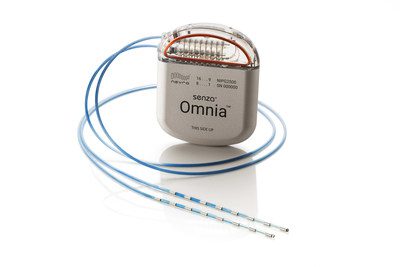
Nevro Corp. (NYSE: NVRO), a global medical device company that is providing innovative, evidence-based solutions for the treatment of chronic pain, today announced receipt of FDA approval of its Senza® System for the treatment of chronic pain associated with Painful Diabetic Neuropathy (PDN).
This approval is specific to Nevro’s unique 10 kHz stimulation, and Nevro now has the only spinal cord stimulation system approved by the FDA with a specific indication to treat PDN. The company will immediately initiate commercial launch activities in the U.S. under its recently launched HFX™ branding, as HFX™ for PDN.1
“This FDA approval marks a capstone achievement that demonstrates the strength of our clinical data and provides a proven, new breakthrough SCS treatment option for PDN patients who are struggling with debilitating pain and who are unable to find relief with currently available pharmacologic options,” said D. Keith Grossman, Chairman, Chief Executive Officer and President of Nevro. “We are thrilled that we can now begin commercial launch activities in the U.S. and believe this new indication will be an important driver of the long-term growth of our business for years to come.”
Mr. Grossman continued, “We would like to thank lead Principal Investigator Dr. Erika Petersen and the entire team of clinical trial investigators and their patients for their study participation and ongoing partnership, without whom this approval would not have been possible.”
Study participants demonstrated significantly improved and sustained outcomes with 10 kHz Spinal Cord Stimulation (SCS), including substantial, sustained pain relief and improved health-related quality of life. The 6-month results for the SENZA-PDN randomized controlled trial (RCT) were previously published in JAMA Neurology2 in April 2021, and the 12-month follow-up results and 6-month crossover patient data were recently presented at the American Diabetes Association 81st Scientific Sessions in June 2021.3 These data will be used to support physician referral decisions as well as market access initiatives to expand payer coverage of this procedure. The company plans to publish these 12-month results, including the 6-month crossover patient data, in a peer-reviewed journal. Study participants will continue to be followed out to 24 months.
“The substantial pain relief and improved quality of life demonstrates that 10 kHz Therapy can safely and effectively treat this patient population,” stated Dr. Erika Petersen, Professor of Neurosurgery, Director of Functional and Restorative Neurosurgery at the University of Arkansas for Medical Sciences, and lead investigator of the SENZA-PDN study. “I’m grateful to my co-investigators and the patients who participated in this study, as the results and this approval will have far-reaching impact on the lives of PDN patients.”
“Diabetic neuropathy is one of the most prevalent and debilitating, chronic complication of diabetes, and for years, PDN patients have struggled with a lack of effective treatment options when conventional medications fail or are not tolerated,” commented Dr. Frances Broyles, Medical Director of Diabetes/Endocrinology and Nutrition at Swedish Health Services in Seattle, Washington. “The ability to now offer Nevro’s proven 10 kHz Therapy, which may enable discontinuation of long-term drug therapy and eliminate unwanted drug side effects, is a welcome addition as a treatment option for my PDN patients dealing with this challenging condition. My personal practice experience with the Nevro 10 kHz Therapy was nothing short of life changing for the patient.”
The company continues to anticipate a mid-single digit million revenue contribution from PDN in 2021, the majority of which is expected to be generated in the fourth quarter, with broader penetration and a larger revenue contribution expected in 2022 and beyond. The revenue ramp is expected to build gradually during the initial months following the launch as awareness increases among referring physicians and patients, patients move through the referral to trial to permanent implant pathway, and access with insurance payers expands. Internationally, the company will be executing phased launch plans in the UK, Germany and Australia, with further expansion planned in 2022.